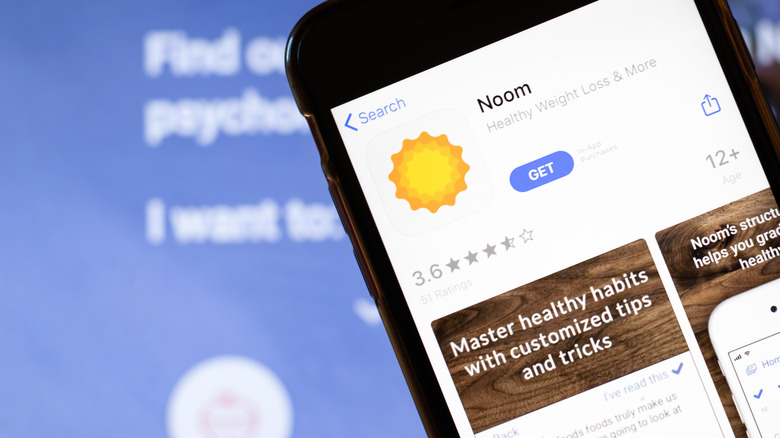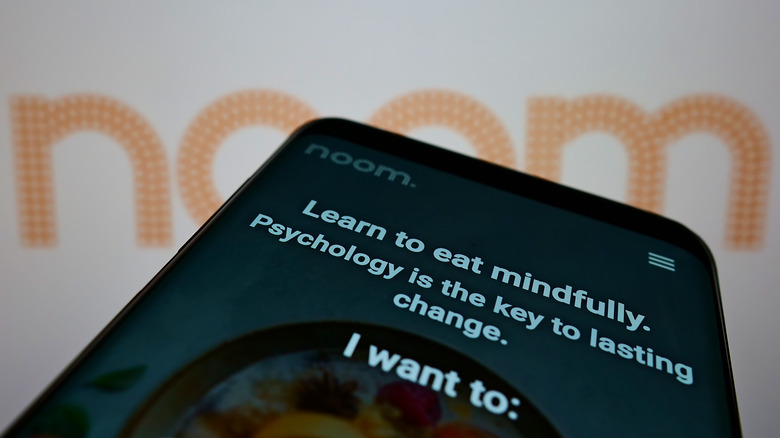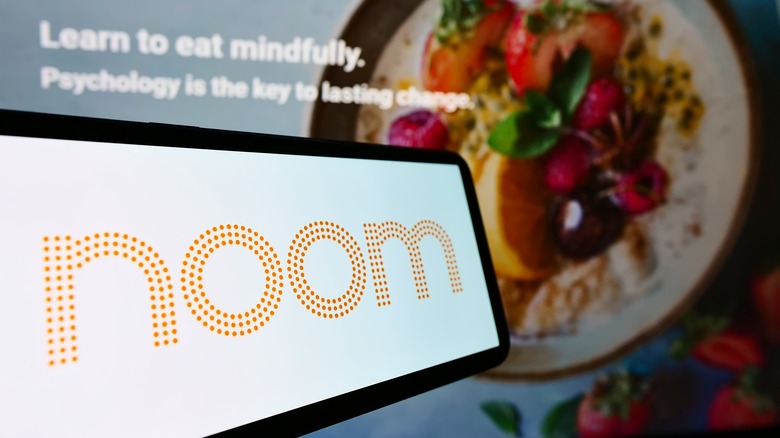Is The Noom Weight Loss App Worth The Money? Here's What Nutritionists Have To Say
If you're a millennial on Instagram, you've seen either ads for the Noom diet or nutritionists posting about the dangers of the app. Noom has actually been around since 2008, but didn't start going viral on social media until the app had an overhaul, per Forbes. It grew from just a calorie and fitness tracker into a one-stop-shop for helping you meet your weight loss goals with the addition of coaches, support groups, and a psychology component meant to help you change your approach to food and eating.
According to Noom, the key to a successful weight loss plan is knowing what foods will help you feel "satisfied" instead of "stuffed" without telling you what you can and cannot eat. Instead, they say anything goes — in moderation. After all: "true lasting weight loss is about so much more than calories in vs. calories out," the focus of most fad diets. But where fad diets restrict what you can eat, Noom is supposed to empower you to make your own food choices.
But as quickly as Noom went viral, it started facing backlash. Users were agreeing that the app didn't promote diet culture—the company's tagline is: "Stop dieting. Get lifelong results." To many, Noom promotes eating disorders, like anorexia, instead.
To help us sort out fact from fiction about the Noom weight loss app, we turned to registered dietitian and women's health expert Jeani Hunt, MS, RD, CD, of Veggie Lush, and nutrition and health coach Alex Marshall for answers.
How Noom works
Before we get into what our experts have to say about whether or not Noom is worth the money, let's get into how the app works. Noom says the goal of their app is to help you get to the root of how you got to your current weight and understand why diets haven't worked for you in the past.
In a review of the app, Forbes shares that when they signed up, they had to take a 10-minute quiz answering questions like weight, height, and whether or not you're prone to things like diabetes, heart disease, or depression. That's not the only time commitment, either; Forbes adds that you have to decide when you sign up — after you agree to pay $59 a month — whether you want to spend 5, 10, or 15 minutes a day on "mini-lessons in psychology and behavior change," which you have 16 weeks to complete.
On their website, Noom explains that 15 minutes a day is the maximum they want you to spend on lessons, quizzes, and other "simple tasks" that are meant to help you "take a deep dive into the emotional and mental aspects of your weight loss." Your biggest task, according to their website, is also your easiest: putting what you eat into their food log "to see how your choices align with your goals."
But when health coach Alex Marshall tried the app last year, she told her Noom experience was very different from what they promised.
The psychology of Noom
One of Noom's biggest selling points as a weight loss tool is that they claim to provide psychological tools that will help support you on your journey. For Forbes, this was also a positive of using the app: being able to get cognitive (CBT) and dialectical (DBT) behavioral therapy tips as they used the app.
But Lauren Muhleim, Psy.D., who specializes in eating disordered patients, explained to Bustle that what you're actually doing is learning how to override your body's natural hunger cues. In Noom's "elephant" lesson specifically — brought up both by Forbes and Bustle — Noom equates a user's hunger to an elephant, telling users they need to learn to be the rider, to tame our cravings and approach food with more level-headedness.
To help you sort through the more nuanced aspects of losing weight, Noom says they have one-on-one coaching and personalized plans tailored to each user's specific need. But in most experiences, there was little to no outreach or support from Noom's coaches. Alex Marshall, a health coach herself, told us that she even reached out to her assigned coach with questions like how to stop binge eating and night, but never received a response.
According to a 2020 Noom memo obtained by Bustle, Marshall might not have received any response because "93% of coaching related tasks" are handled by artificial intelligence.
Marshall adds the only time she ever did get a response from her Noom coach was when she cancelled her membership.
Other claims Noom has made
Questions about the claims Noom has made resurfaced again in early 2022, when the company faced major backlash over their "clean plate" ad campaign. One Twitter user wrote they felt "every Noom ad is like "we're NOT a diet. We're an eating disorder," inspiring others to share their experience with the weight loss app.
One registered dietitian responded to the thread, sharing that they had applied to work at Noom in 2017. With Noom's reputation for offering lifestyle coaching and changes — and their promises they have a team of heavier health experts — it was shocking when one woman shared she was turned down for a job with Noom for having "too much experience" in her field.
Noom also claims to take eating disorders very seriously. In a statement to The Independent, Noom promised that they were "actively work[ing] to avoid causing harm to or triggering someone who has experienced a harmful relationship with food in the past." They also claim to not allow users with a history of eating disorders to sign up for the app. In health coach Alex Marshall's experience, however, she was able to set her goal weight as what she weighed in high school and specified that she wanted to lose 30 pounds in 19 weeks.
Noom's diet rules are that you can eat whatever you want as long as it's within the daily calorie range they give you. Marshall says Noom gave her a max calorie intake of 1200.
For Noom, there are green, yellow, and red food categories
It's important to note that while different bodies have different requirements, the Dietary Guidelines for Americans says the average American woman needs 2000 calories a day to function.
The idea behind Noom is that they want to teach you how to hold yourself accountable for your weight, boiling down an incredibly nuanced issue into what seems as simple as a choice, registered dietitian Jeani Hunt, MS, RD, CD told us in an email. While claiming to empower their users to make their own choices — opting not to say people can't eat certain foods — Noom does ask users to log every calorie and sorts foods into three categories: green, yellow, and red.
Hunt adds that it's not just the low daily calorie allowance that is problematic; Noom categorizes healthy foods, like nuts, seeds, or even olive oil that are calorie-dense, as a "red" food despite claiming not to categorize food as "good" or "bad." For Noom, calorie dense equates to "stuffing," despite the fact that, according to Shana Minei Spence, RDN, told Bustle that caloric-dense food like peanut butter — a "red" food for Noom — leaves people feeling more satisfied and satiated than a handful of baby carrots. Despite Noom's claims, fat is actually good for you.
Sarah MacDonald, a swim coach and former Noom user, adds that eating mostly vegetables for two weeks will clean out your body and help you lose weight — but only in the short term (via Bustle).
These are the lasting effects of using Noom
The dangers of stopping using Noom's diet program are the same as stopping any other diet program. Registered dietitian Jeani Hunt, MS, RD, CD told us that to her, Noom isn't any different than any other weight loss app out there; as much as the app claims they're a lifestyle change, not a diet, all Noom has really done is repackaged the idea that ending the day in a calorie deficit is what helps you lose weight. Which it does — until you start eating normally again. If you can.
For Aiden, a former Noom user who talked to Bustle, categorizing food and counting calories followed them years after they stopped their diet. Molly Robson, a nutritionist in Boston, adds that many of her clients have a hard time giving up counting calories, terrified that if they stop keeping track of every calorie they eat, they'll gain the weight right back (via Bustle).
Just like with any other fad diet, along with the dangers of pushing yourself into an eating disorder, diets simply don't work long term. Instead, they leave you with a lifetime of side-effects to manage, making eating and living normally again difficult (via University of Georgia). Don't be fooled; just because Noom says they aren't a fad diet doesn't mean they aren't.
For most Noom users, their experience is a cycle of a little weight loss, gaining the weight back, deleting and then re-downloading the app.





